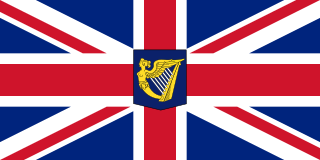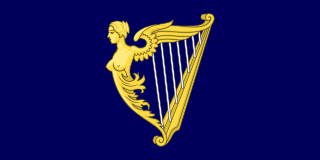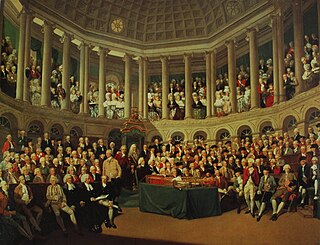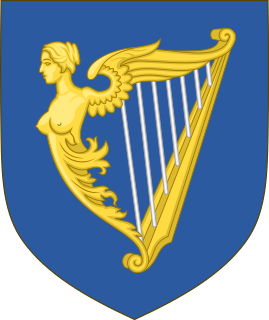Related Research Articles

The Parliament of the United Kingdom is the supreme legislative body of the United Kingdom, the Crown dependencies and the British overseas territories. It alone possesses legislative supremacy and thereby ultimate power over all other political bodies in the UK and the overseas territories. Parliament is bicameral but has three parts, consisting of the sovereign (Crown-in-Parliament), the House of Lords, and the House of Commons. Both houses of Parliament meet in separate chambers at the Palace of Westminster in the City of Westminster, one of the inner boroughs of the capital city, London.

Northern Ireland is a part of the United Kingdom that is variously described as a country, province, territory or region. Located in the northeast of the island of Ireland, Northern Ireland shares a border to the south and west with the Republic of Ireland. In 2011, its population was 1,810,863, constituting about 30% of the island's population and about 3% of the UK's population. The Northern Ireland Assembly, established by the Northern Ireland Act 1998, holds responsibility for a range of devolved policy matters, while other areas are reserved for the British government. Northern Ireland co-operates with the Republic of Ireland in several areas.

Oliver Cromwell was an English general and statesman who, first as a subordinate and later as Commander-in-Chief, led armies of the Parliament of England against King Charles I during the English Civil War, subsequently ruling the British Isles as Lord Protector from 1653 until his death in 1658. He acted simultaneously as head of state and head of government of the new republican commonwealth.

The United Kingdom of Great Britain and Northern Ireland, commonly known as the United Kingdom (UK) or Britain, is a sovereign country in north-western Europe, off the north-western coast of the European mainland. The United Kingdom includes the island of Great Britain, the north-eastern part of the island of Ireland, and many smaller islands within the British Isles. Northern Ireland shares a land border with the Republic of Ireland. Otherwise, the United Kingdom is surrounded by the Atlantic Ocean, with the North Sea to the east, the English Channel to the south and the Celtic Sea to the south-west, giving it the 12th-longest coastline in the world. The Irish Sea separates Great Britain and Ireland. The total area of the United Kingdom is 93,628 square miles (242,500 km2), with an estimated population in 2020 of over 67 million.

The United Kingdom is a unitary state with devolution that is governed within the framework of a parliamentary democracy under a constitutional monarchy in which the monarch, currently Queen Elizabeth II, is the head of state while the Prime Minister of the United Kingdom, currently Boris Johnson, is the head of government. Executive power is exercised by the British government, on behalf of and by the consent of the monarch, and the devolved governments of Scotland, Wales and Northern Ireland. Legislative power is vested in the two chambers of the Parliament of the United Kingdom, the House of Commons and the House of Lords, as well as in the Scottish and Welsh parliaments. The British political system is a two party system. Since the 1920s, the two dominant parties have been the Conservative Party and the Labour Party. Before the Labour Party rose in British politics, the Liberal Party was the other major political party, along with the Conservatives. While coalition and minority governments have been an occasional feature of parliamentary politics, the first-past-the-post electoral system used for general elections tends to maintain the dominance of these two parties, though each has in the past century relied upon a third party, such as the Liberal Democrats, to deliver a working majority in Parliament. A Conservative–Liberal Democrat coalition government held office from 2010 until 2015, the first coalition since 1945. The coalition ended following parliamentary elections on 7 May 2015, in which the Conservative Party won an outright majority of seats, 330 of the 650 seats in the House of Commons, while their coalition partners lost all but eight seats.

The Bill of Rights 1689, also known as the Bill of Rights 1688, is a landmark Act in the constitutional law of England that sets out certain basic civil rights and clarifies who would be next to inherit the Crown. It received the Royal Assent on 16 December 1689 and is a restatement in statutory form of the Declaration of Right presented by the Convention Parliament to William III and Mary II in February 1689, inviting them to become joint sovereigns of England. The Bill of Rights lays down limits on the powers of the monarch and sets out the rights of Parliament, including the requirement for regular parliaments, free elections, and freedom of speech in Parliament. It sets out certain rights of individuals including the prohibition of cruel and unusual punishment and confirmed that "Protestants may have arms for their defence suitable to their conditions and as allowed by law". It also includes no right of taxation without Parliament's agreement. Furthermore, the Bill of Rights described and condemned several misdeeds of James II of England.

The Irish Free State was a state established in 1922 under the Anglo-Irish Treaty of December 1921. That treaty ended the three-year Irish War of Independence between the forces of the Irish Republic, the Irish Republican Army (IRA), and British Crown forces.

The United Kingdom has four legal systems, each of which derives from a particular geographical area for a variety of historical reasons: English law, Scots law, Northern Ireland law, and, since 2007, purely Welsh law. Overarching these systems is the law of the United Kingdom, also known as United Kingdom law. UK law arises from laws applying to the United Kingdom and/or its citizens as a whole, most obviously constitutional law, but also other areas, for instance tax law.
A member of parliament (MP) is the representative in parliament of the people who live in their electoral district. In many countries with bicameral parliaments, this term refers only to members of the lower house since upper house members often have a different title. The terms congressman/congresswoman or deputy are equivalent terms used in other jurisdictions. The term parliamentarian is also sometimes used for members of parliament, but this may also be used to refer to unelected government officials with specific roles in a parliament and other expert advisers on parliamentary procedure such as the Senate Parliamentarian in the United States. The term is also used to the characteristic of performing the duties of a member of a legislature, for example: "The two party leaders often disagreed on issues, but both were excellent parliamentarians and cooperated to get many good things done."

The Oireachtas, sometimes referred to as Oireachtas Éireann, is the legislature of Ireland. The Oireachtas consists of:

The Government of Ireland Act 1920 was an Act of the Parliament of the United Kingdom. The Act's long title was "An Act to provide for the better government of Ireland"; it is also known as the Fourth Home Rule Bill or (inaccurately) as the Fourth Home Rule Act. The Act was intended to partition Ireland into two self-governing polities: the six north-eastern counties were to form "Northern Ireland", while the larger part of the country was to form "Southern Ireland". Both territories were to remain part of the United Kingdom of Great Britain and Ireland, and provision was made for their future reunification through a Council of Ireland. The Act was passed by the British Parliament in November 1920, received royal assent in December, and came into force on 3 May 1921.

Southern Ireland was the larger of the two parts of Ireland that were created when Ireland was partitioned by the Government of Ireland Act 1920. It comprised 26 of the 32 counties of Ireland or about five-sixths of the area of the island, whilst the remaining six counties in the northeast of the island formed Northern Ireland. Southern Ireland included County Donegal, despite it being the largest county in Ulster and the most northerly county in all of Ireland.

The Acts of Union 1800 were parallel acts of the Parliament of Great Britain and the Parliament of Ireland which united the Kingdom of Great Britain and the Kingdom of Ireland to create the United Kingdom of Great Britain and Ireland. The acts came into force on 1 January 1801, and the merged Parliament of the United Kingdom had its first meeting on 22 January 1801.

The Kingdom of Ireland was a monarchy on the island of Ireland that was a client state of the Kingdom of England and then of Great Britain. It existed from 1542 until 1800. It was ruled by the monarchs of England and then the monarchs of Great Britain. The kingdom was administered from Dublin Castle by a viceroy appointed by the English king — the Lord Deputy of Ireland. A Parliament of Ireland, composed of Anglo-Irish and native nobles, was created. From 1661-1801, the administration controlled an army. A Protestant state church — the Church of Ireland — was established. Although styled a kingdom, for most of its history it was, de facto, an English dependency. This status was enshrined in Poynings' Law and in the Declaratory Act of 1719.

The House of Commons is the name for the elected lower house of the bicameral parliaments of the United Kingdom and Canada. In the UK and Canada, the Commons holds much more legislative power than the nominally upper house of parliament. The leader of the majority party in the House of Commons by convention becomes the prime minister. Other parliaments have also had a lower house called a "House of Commons".

The Parliament of Ireland was the legislature of the Lordship of Ireland, and later the Kingdom of Ireland, from 1297 until 1800. It was modelled on the Parliament of England and from 1537 comprised two chambers: the House of Commons and the House of Lords. The Lords were members of the Irish peerage and bishops. The Commons was directly elected, albeit on a very restricted franchise. Parliaments met at various places in Leinster and Munster, but latterly always in Dublin: in Christ Church Cathedral, Dublin Castle, Chichester House (1661–1727), the Blue Coat School (1729–31), and finally a purpose-built Parliament House on College Green.

The Wars of the Three Kingdoms, sometimes known as the British Civil Wars, were an intertwined series of conflicts that took place between 1639 and 1653 in the Kingdoms of England, Scotland and Ireland – separate kingdoms which had the same king, Charles I. The wars were fought mainly over issues of governance and religion, and included rebellions, civil wars and invasions. The English Civil War has become the best-known of these conflicts. It ended with the English parliamentarian army defeating all other belligerents, the execution of the King, the abolition of the monarchy, and the founding of the Commonwealth of England; a unitary republic which controlled the British Isles until 1660.

In the United Kingdom, a Member of Parliament (MP) is an individual elected to serve in the House of Commons of the Parliament of the United Kingdom.

The United Kingdom of Great Britain and Northern Ireland (UK), since 1922, comprises four constituent countries: England, Scotland, and Wales, as well as Northern Ireland. The UK Prime Minister's website has used the phrase "countries within a country" to describe the United Kingdom. Some statistical summaries, such as those for the twelve NUTS 1 regions of the United Kingdom, refer to Scotland, Wales, and Northern Ireland as "regions". With regard to Northern Ireland, Scotland and Wales particularly, the descriptive name one uses "can be controversial, with the choice often revealing one's political preferences".
Following the enactment of the House of Lords Act 1999, the number of hereditary peers entitled to sit in the House of Lords was reduced to ninety-two. Ninety of the first ninety-two were elected by all the hereditary peers before the passing of the reform. Since November 2002, by-elections have been held to fill vacancies left by deaths, resignations or disqualifications of those peers. Since the passing of the House of Lords Reform Act 2014, by-elections have also been held to fill vacancies left by the retirements of those peers.